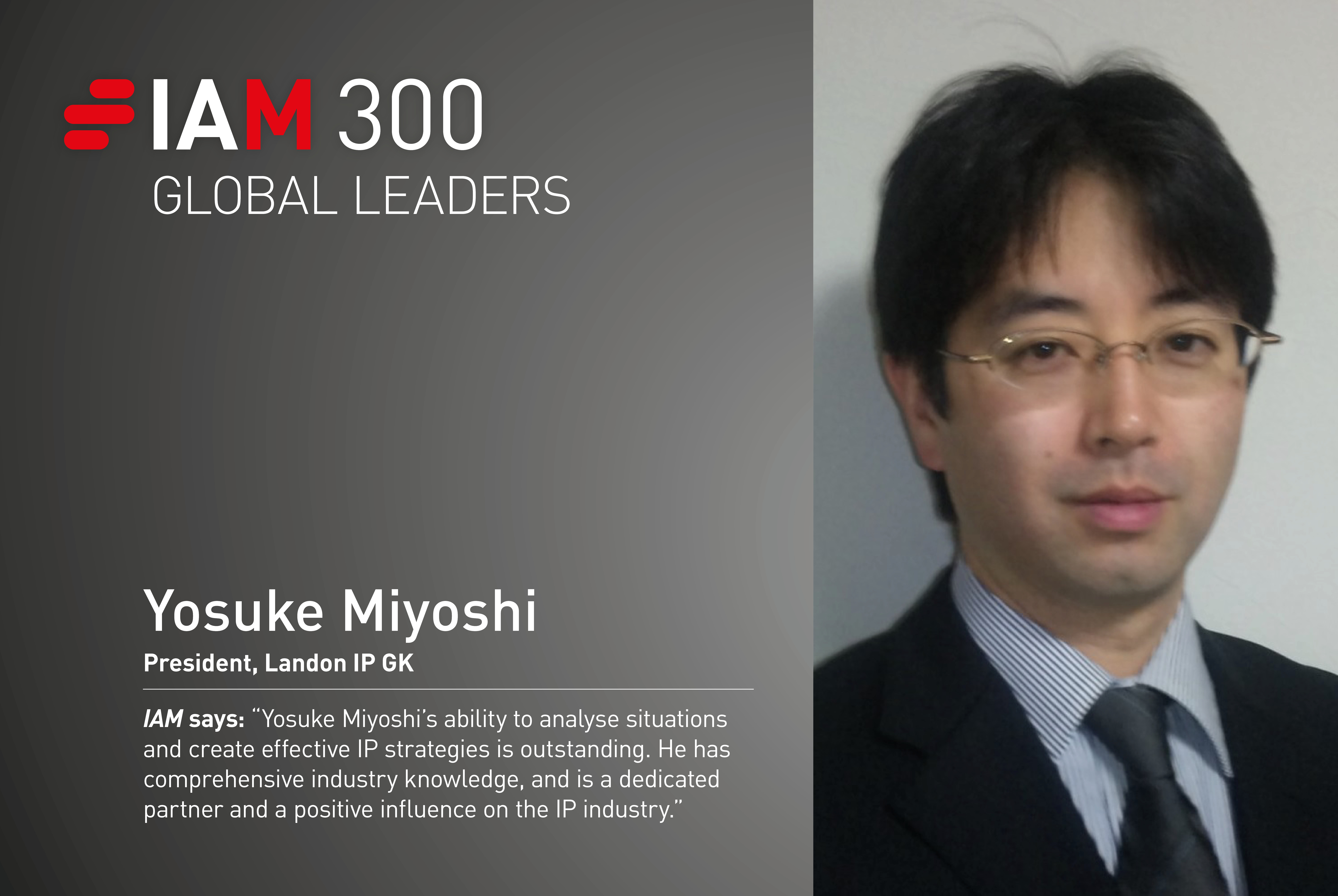Yosuke Miyoshi
What are some of the biggest obstacles you have had to face in your professional life and how did you overcome them?
Internal conflict – sometimes big companies cannot consolidate negotiation strategies while they have various interests in each of their sub-organisations. As well as internal negotiation efforts, I recognise that maintaining trustworthy, faithful and fair relationships with members of the community and key people in the organisation is crucial for overcoming such internal conflicts.
How have attitudes to IP monetisation changed throughout the course of your career and what could be the next big developments?
These have shifted drastically. Currently, it is common for people in Japanese companies to consider IP monetisation, although it is now regarded in almost the same light as when it was first carved out 20 years ago. It is high time that we revisit how each piece of intellectual property boosts the value of the whole portfolio, with complementary relationships to other intellectual assets and how well they are organised together.
What are some of the pressing challenges that your clients are facing right now – and how are you helping them to overcome these?
First, the new frontier. Clients need to know how effective intellectual property can be and how much risk it can involve when they attempt to penetrate new markets for production, for example in Southeast Asia or Africa.
Second, innovation involving emerging technologies. Sometimes, clients are unable to patent their new technology as it is too early and they must be prepared for this when applying.
For both of these challenges, I would help my clients by providing a fact-based scenario, which includes not only patent search results but non-patent literature, litigation records and investment information if required.
How are you seeing rapid developments in AI impact the IP ecosystem?
AI is shaping a new IP landscape and will affect where we should focus our necessary insights. A possible impact of AI development could be an increased need to find novel usage of patents, for example utilising a patent or technology to products that are far removed from the patent’s origin.
As president of Landon IP, what does stellar leadership look like to you?
Being able to hold multiple perspectives is important for any leader. Not only with regard to patents but also when it comes being able to see different business and HR management solutions – all of this is crucial for effective leadership. Above all, always remain clear, fair and logical.
If you could make one change to IP valuation what would it be – and do you think it is likely to happen?
Even though such a change is unlikely to be realised, I would like to see tracking and documenting of speculative scenarios – not only with regard to their valuation processes, but also in their assignment and licence contracts, by stipulating a kind of options trading clause.
As well as leading Landon IP, you are also a visiting professor at Tokyo Fuji University and visiting Researcher of Global Security Research Institute at Keio University. What skills should the next generation of IP professionals be looking to hone?
Negotiation and decision-making skills should be a priority. Unfortunately, many IP professionals are still too passive. Even if they are not perfectly skilled decision-makers, they should still understand how leaders make choices and what they need to inform these (eg, facts, speculation, or insights).
How have client expectations changed over the last decade, and how have you had to develop your practice in order to meet these?
Clients are expecting us to go beyond using IT and cloud-based tools. Now we are able to carry out patent search and analysis with increased depth due to the progression of such tools. Thus, as a professional service, we should provide more detailed, more sophisticated and widely sourced information.
What, for you, are the most crucial steps of any IP monetisation process?
For me, managing reasonable expectations about new technology and its related patents is a key step. Obviously, this is subject to the validity and scope of the product’s patent, but it can yield answers to questions about who would be the best player to realise a patent’s monetisation potential and who could pay the best rate.
Can you deal us about your most memorable deal or project, and what made it stand out?
It is difficult to disclose details about specific deals due to confidentiality, but speaking generally, technology transfer projects are quite impressive to me. There are so many items to be negotiated, not just concerning legal aspects but also technology, HR management, business models and local regulatory issues. Sometimes, with Chinese entities for example, negotiations require a deep understanding of the other party’s culture and history.
Yosuke Miyoshi
President of Landon IP GK
Yosuke Miyoshi is president of Landon IP GK. After engaging in various IP-related deals, including litigation, licensing, tech-transfer, and M&A for NEC Corporation and Nissin Foods Holdings, Mr Miyoshi now leads patent search and analytics projects as a head of the company. He is also recognised by various academic organisations as an excellent lecturer for MBA course in negotiation and risk-management.
